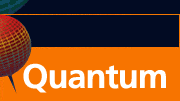CONTACTS
- Coordinator
Adolfo del Campo
-
Quantum Lunch Location:
T-Division Conference Room, TA-3,
Building 123, Room 121
 |


Quantum Institute: Visitor Schedule
The Quantum Lunch is regularly held on Thursdays in the Theoretical Division Conference Room, TA-3, Building 123, Room 121.
The organizing committee includes Malcolm Boshier (P-21), Adolfo del Campo (T-4 & CNLS), Michael Di Rosa (C-PCS), Armin Rahmanisisan (T-4 & CNLS), Changhyun Ryu (P-21) , Nikolai Sinitsyn (T-4), Rolando Somma (T-4), Christopher Ticknor (T-1), and Wojciech Zurek (T-4).
For more information, or to nominate a speaker, contact Adolfo del Campo.
To add your name to the Quantum Lunch email list, contact Ellie Vigil.
Thursday, June 20, 2013
12:30 PM - 2:00 PM
Speaker: Jess Riedel (IBM)
Technical Host: Wojciech Zurek
TOPIC: Decoherence and the Quantum Detection of Classically Undetectable Phenomena
Abstract
I consider the general problem of exploiting quantum mechanics to detect weak particles and forces. A phenomenon is detectable using classical methods if and only if the effective Hamiltonian coupling it to normal matter does not commute with the classically preferred basis. Classically undetectable phenomena can still be observed, but they require coherent superpositions and measurements which do not commute with the preferred basis. The shot noise limit, the standard quantum limit, and (surprisingly) the Aharonov-Bohm effect are special unitary cases of such generalized Quantum Enhanced Measurements (QEMs). I extend this framework to the non-unitary case of weak phenomena producing entangling decoherence. In particular, I propose directly detecting dark matter through the decoherence it causes rather than its classical effects such as recoil or ionization, and I show that matter interferometers are sensitive to sub-MeV dark matter which transfers negligible momentum and hence is inaccessible to classical techniques. The coherent control of Planck-mass superpositions could even enable the detection of gravitons. Finally, I draw a distinction between QEMs like the shot noise limit which are based on a preferred basis of unentangled particles, and so-called quantum enabled measurements which are based on a preferred basis of wavepackets.
|


